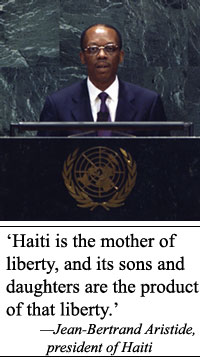Haitian president calls for reparations
By by Saeed ShabazzStaff Writer | Last updated: Oct 8, 2003 - 10:27:00 PM
What's your opinion on this article?
- Related article: How the U.S. impoverished Haiti

|
He spoke about the genocide inflicted on the Amerindians and then on the 15 million Africans taken as slaves and brought to Haitian soil in 1502. "For three centuries, my continent provided 70 percent of the world’s gold reserves, which would equal 2,849,000 tons of gold evaluated at $36 billion U.S. currency," Mr. Aristide argued. He added that Haiti, though impoverished, would continue to shine like a gleaming beacon beyond the darkness of colonization.
"Haiti is the mother of liberty, and its sons and daughters are the product of that liberty," Mr. Aristide said. He also said that Haiti was the geographical axis for the freedom of all Blacks.
The General Assembly loudly applauded Mr. Aristide’s speech, after which a long line of diplomats and officials waited to greet him in the Indonesian Lounge located behind the General Assembly hall. One diplomat, speaking on the condition of anonymity, told The Final Call that Mr. Aristide was "a Black revolutionary."
While Mr. Aristide used the General Assembly debate to push for reparations, other diplomats spoke of the need to strengthen the General Assembly.
Julian Robert Hunte of Saint Lucia, president of the 58th session of the General Assembly, called for the revitalization and strengthening of the assembly. He said that current global problems and challenges had opened a window for the General Assembly to broaden its impact on global affairs, and, in that regard, it needed to move boldly to respond to criticism with deeds, not words.
"The people of the world look to the United Nations for hope in implementing solutions to their problems," Mr. Hunte said. He expressed his hope that the General Assembly was ready to break new ground and record significant accomplishments. "However, that would require choosing principle over expediency, precision over ambiguity, objectivity over bias, creative thinking over inflexibility," Mr. Hunte stressed.
Mr. Hunte is Minister of External Affairs, International Trade and Civil Aviation, a Senator and Member of Parliament, a Justice of the Peace and a business executive.
But some diplomats spoke of a pessimism that shrouded the world body. Felipe Perez Roquez, Minister of Foreign Affairs of Cuba said he believed that all would agree that the role of the United Nations was irrelevant, or at least, was on its way to being so.
"Frankly, what role did the General Assembly play today?" asked Mr. Roquez. "Almost none, really," he said. It was merely a forum for debate, without any true influence or practical role whatsoever, he commented. In his view, sadly, international relations are not governed by the purposes or principle of the UN Charter or the respect for the sovereignty of nations. "The unilateral action in Iraq, as well as the imposition of a near 40-year economic blockade on Cuba was proof of that," Mr. Roquez argued.
"The new world order should be founded on the honest and generous recognition by the only remaining superpower that it should contribute to, and not interfere with, the creation of a peaceful planet, where everyone is entitled to justice and development," Mr. Roquez said. Still, he said he believed that the international community should not relinquish multilateralism.
"We cannot relinquish the United Nations and we cannot and should not relinquish the struggle for a world of peace, justice, equality and development for all," Mr. Roquez added.
Some diplomats are saying that the only solution is to reaffirm the power and prestige of the General Assembly by having it share the power with the Security Council on questions of peace and security, as conceived by the Charter signatories—one nation, one vote.
INSIDE STORIES AND REVIEWS
-
-
About Harriett ... and the Negro Hollywood Road Show
By Rabiah Muhammad, Guest Columnist » Full Story -
Skepticism greets Jay-Z, NFL talk of inspiring change
By Bryan 18X Crawford and Richard B. Muhammad The Final Call Newspaper @TheFinalCall » Full Story -
The painful problem of Black girls and suicide
By Charlene Muhammad -National Correspondent- » Full Story -
Exploitation of Innocence - Report: Perceptions, policies hurting Black girls
By Charlene Muhammad -National Correspondent- » Full Story -
Big Ballin: Big ideas fuel a father’s Big Baller Brand and brash business sense
By Bryan Crawford -Contributing Writer- » Full Story






 Click Here Stay Connected!
Click Here Stay Connected!








